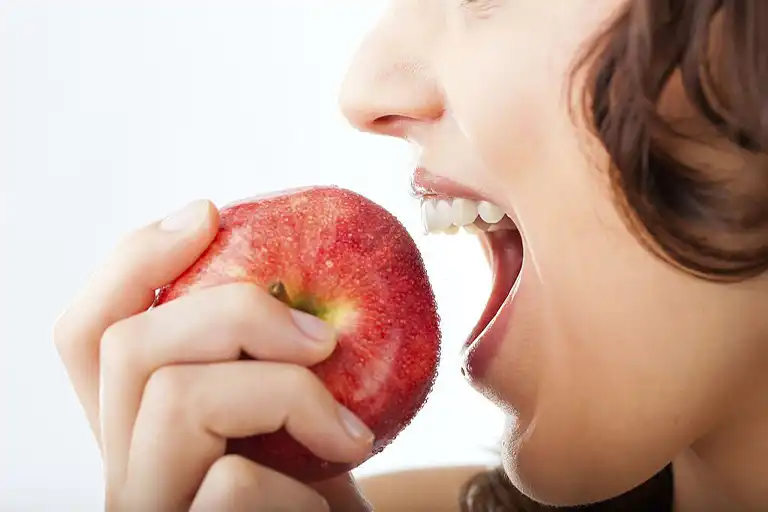Have you ever had TMJ pain after eating something hard like a piece of bread, corn, or snacking on meat? Although stress is a common trigger for TMJ pain, the food you eat can also cause pain. For someone with temporomandibular joint disorder, eating can literally be a real pain. Because of the discomfort that eating can cause, it is important that those suffering from TMJ pain take extra care to ensure they are getting the nutrition they need.
What is TMJ?
TMJ stands for temporomandibular joint disorder, which is a condition that affects the joint connecting the jawbone to the skull. It can cause pain and discomfort in the jaw, face, and neck.
TMJ can be caused by a variety of factors, including injury, arthritis, teeth grinding, stress, and genetics. Symptoms may include pain or tenderness in the jaw, difficulty opening or closing the mouth, clicking or popping sounds when moving the jaw, and headaches or earaches.
What are the worst foods for TMJ?
Avoid eating foods that cause discomfort or pain in the jaw joint as these foods aggravate TMJ symptoms. The following can be a good guide:
Hard and crunchy foods
Both crunchy and hard foods are hard to chew and put a lot of pressure on the jaw. This type of pressure on the jaw can increase TMJ pain.

Therefore, you should avoid crunchy and hard foods such as popcorn, chips, peanut brittle, hard nuts, pizza, raw vegetables, hard meats, large pieces of fruit and vegetables, or chewing gum. These foods require a lot of chewing and put pressure on the jaw.
Chewy foods
Like crunchy food, chewy food can also aggravate your TMJ symptoms. With chewing food, your jaw has to work overtime in constant motion. It can make your TMJ pain worse. To prevent such pain and worsening symptoms, you should avoid chewy foods such as candy, chocolate with dried fruit pieces, cereal grains, barbecue, and beef.
Sticky foods
Foods that stick to the teeth such as sweet treats, chocolate, pretzels, cookies, cinnamon rolls, biscuits, caramel, popcorn, and nuts are also not TMJ-friendly. In addition to sticking to the teeth, these foods require a lot of jaw movements.
Inflammatory foods
Inflammatory foods such as processed foods, alcohol, caffeine, gluten, and some vegetables such as peppers and eggplants, which are allergens, can cause inflammation in the body and create problems when your TMJ is aching.
Foods that require excessive jaw movement
Foods that require excessive jaw movement, such as large bites, corn on the cob, sandwiches, and large pieces of fruit can also cause excessive jaw opening and worsen TMJ symptoms.
What are the good foods for TMJ?
There are various factors that make TMJ disorder worse. While self-care at home is always recommended to help you find relief, it is best to have a professional examination by your doctor to know what works for you. When it comes to foods, it is better to opt for softer foods to put less pressure on your TMJ when chewing.
Nutritious smoothies and pureed soups will help you with TMJ relief. The best foods for TMJ are those that don’t require a lot of chewing. Fruits such as bananas, apple sauce, and canned fruit in 100 percent juice are good choices.
Soft foods
Eating soft foods such as mashed potatoes, smoothies, and soups can help reduce pressure on your jaw muscles because these foods do not require much chewing. Cooked vegetables containing magnesium can also help relax muscles and reduce tension in the jaw.
Foods rich in omega-3 fatty acids
Omega-3 fatty acids have anti-inflammatory properties that can help reduce inflammation in the jaw joint. Foods rich in omega-3 include fatty fish such as salmon, nuts, and seeds, which should be pureed to make them easier to eat.
Foods rich in calcium
Calcium is essential for the strength of bones and teeth, including the jawbone. It is better to consume calcium-rich foods in liquid or softened and cooked form that does not require a lot of chewing and does not put pressure on the jaw.
Proteins
Chicken, meat, cooked and softened fish can be consumed. But it is better to turn them into pieces or mashed so that it is easier to chew. You can also use scrambled eggs and useful legumes in pureed form.

Liquids
A fluid diet can include juices, smoothies, soups, and purees, which help reduce pain while chewing. Make sure your proteins, carbs, vegetables, and fruits are all included in these liquid diet options to help you heal faster.
Whole grains
By eating these grains, we get healthy vegetable protein, fiber, vitamins, minerals and all kinds of plant material that are useful for health. These grains include cream of wheat, oatmeal, roasted corn, and brown rice. For those who have TMJ problems, they should consume this cereal in a softened form.
How to prevent TMJ pain?
In addition to eating the right foods, there are other ways you can take care of your jaw in your daily life to prevent painful relapses. You may be able to reduce symptoms by reducing your stress, checking yourself to make sure you’re not clenching your jaw or grinding your teeth, using physical therapy, and exercising.
It is important to perform TMJ exercises designed to strengthen, stretch, and relax the jaw.
Wearing a mouth guard can be an effective way to prevent TMJ, especially if it is caused by grinding or clenching your teeth. A mouth guard can help reduce pressure on the jaw joint and prevent damage to the teeth. Mouthguards can be custom-made by a dentist.
Other ways to prevent TMJ include practicing good posture, avoiding chewing gum, and reducing stress through relaxation techniques such as meditation or yoga.
Conclusion
The best foods for TMJ include soft, easy-to-chew foods such as cooked vegetables, fruits, fish, and eggs. It is also important to maintain a balanced diet with adequate amounts of calcium and magnesium.
On the other hand, the worst foods for TMJ include hard and crunchy foods, chewy foods, and foods that require excessive jaw movement. Additionally, it is recommended to avoid caffeine, alcohol, and tobacco products as these can have TMJ disorders.
